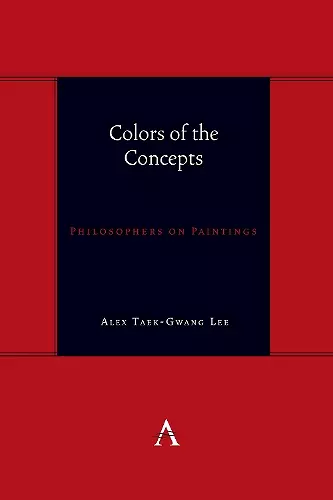Colors of the Concepts
Philosophers on Paintings
Format:Paperback
Publisher:Anthem Press
Published:5th Aug '25
Should be back in stock very soon

Examines how key philosophers shaped their ideas through direct engagement with specific artworks, highlighting the profound influence of painting on philosophical thought
This book is designed as an academic monograph but is intended for a general audience.
This short monograph explores the intersection of philosophy and painting, examining how major thinkers from Hegel to Merleau-Ponty developed key concepts through their engagement with specific artworks. Unlike traditional surveys, my book focuses on philosophers’ ideas as they emerged from concrete encounters with paintings, offering both scholars and general readers fresh insight into philosophical thought. By analysing these interactions, the book illuminates the often-overlooked connection between visual art and abstract reasoning, tracing the evolution of philosophical ideas through tangible, visual experiences. This approach not only bridges aesthetics with other philosophical branches but also presents a unique contribution to the history of ideas, demonstrating how painting has shaped philosophical thoughts. Ultimately, this work provides a novel perspective on familiar philosophical concepts, revealing the profound influence of art on intellectual history.
“An incisive, much-overdue study of the place that painting has played in the work of eight major European thinkers. Through a series of careful pairings, Colors of the Concepts offers fresh insight into familiar philosophical concepts, shows how painting has acted as a vital impetus to thought, and invites us to acknowledge the relationship between painting and philosophy as one of intense kinship.” —Kamini Vellodi, Head of Painting at the Royal College of Art, London
“Written in a highly accessible and engaging style of short essays describing the concrete encounters between philosophers and specific paintings, the contemporary theorist Alex Taek-Gwang Lee manages to create a fresh exhibit of philosophy and art as an alternate itinerary to the next visit to the Tate Modern.” —Gregg Lambert, Dean’s Professor of Humanities, Syracuse University
“Alex Taek-Gwang Lee’s book turns the spotlight back on painting and art as the original language through which human perceptions of the self and the world are articulated. Philosophy is cast as a hunt for the systemic restitution of a more inscrutable experience first negotiated in art. Philosophy avoids the arbitrariness of artistic language yet cannot itself thrive without art’s deep engagement with the primal existential questions. Lee’s idea, therefore, of charting the paths of origin of several major philosophers as an encounter with a particular painting or a set of paintings by major artists is interesting as it is novel. This should whet the appetite of art enthusiasts and academics alike and also attract a lay readership brought up on ideas of art, especially the visual and plastic arts, needing philosophical gravitas to become a cultural presence to be reckoned with. Lee’s proposal demonstrates that painting, as experience, is the nascent, nebulous state of philosophy. All it needs is to be drawn out and demonstrated in context, and thus, as a linguistic system that assumes the mantle of philosophy. Painting and Philosophy are projected not as competing forces but as complementary collaborators working toward a better understanding of being in the world, of being in time. I find this idea fascinating.” —Debasish Lahiri, Senior Lecturer, University of Calcutta
“While visual metaphors have long formed part of the ways in which we perceive knowledge, there has been surprisingly little commentary on how philosophers perceived the function of paintings in society. The Colors of the Concepts redresses this balance, arguing that artistic shifts away from realism occurred during the wider context of the emergence of understanding the unconscious. This readable and erudite study surveys a Who’s Who of thought, including Kant, Spinoza, Freud, and Sartre, to show not only how they critically engaged with art but also how art is crucial to how these thinkers developed and responded to the world around them.” —Paul A. Scott, Professor of French, University of Kansas, USA
ISBN: 9781839994227
Dimensions: 229mm x 153mm x 10mm
Weight: 219g
156 pages